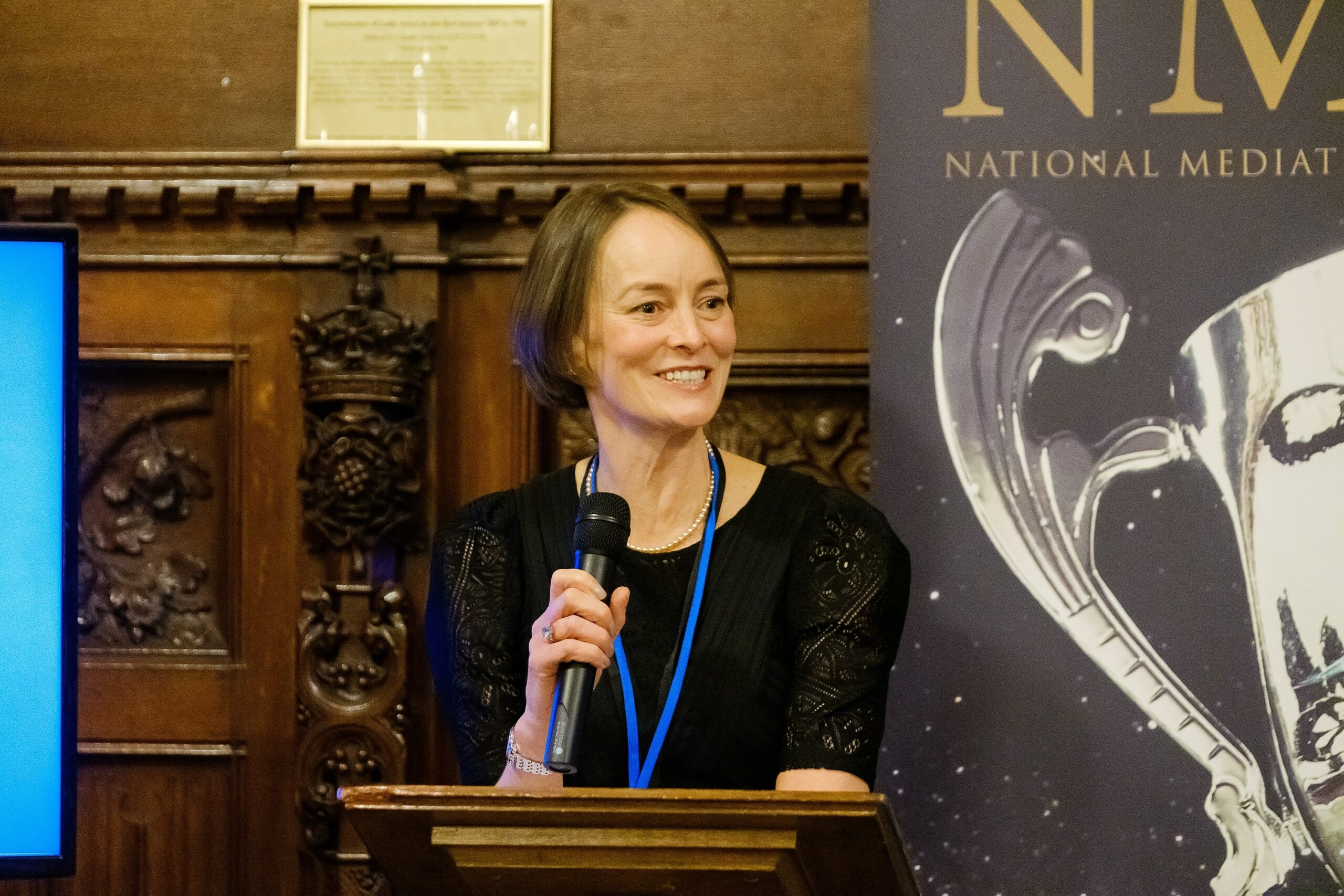A 3 Year Expedition: Rebecca Clark Reflects on her Time as CMC Chair
A 3 Year Expedition: Rebecca Clark Reflects on her Time as CMC Chair
Rebecca Clark shares her journey as CMC Chair over the past three years, highlighting significant achievements and transformative changes within the organisation and the mediation sector as a whole. Her insights provide a compelling narrative on the advancements in mediation and the crucial role played by the CMC. This article offers a thoughtful perspective on the progress made and the challenges overcome during her tenure.
BY REBECCA CLARK
There are many journey metaphors. “It’s been a rollercoaster” (see all reality tv shows ever), “it’s too far for a person to travel in one day” (one I use in mediation quite often) and “tour of duty” (a period of service often demanding or challenging). And it was journey metaphors which came into my mind when I sat down to write this, but I would probably choose a “journey of discovery”, as most appropriate. The CMC is certainly on the “road to success” albeit I would say by way of a cable car steadily progressing up a steep mountain, rather than by rollercoaster.
However we describe the change between where we start and where we end up, what is clear is just how far we have travelled. I feel immensely proud of what the organisation has achieved in the past 3 years and as I step down as Chair, wanted to reflect on what we have accomplished in this time as a CMC team and as a profession.
However we describe the change between where we start and where we end up, what is clear is just how far we have travelled.

My time in office started with the Civil Justice Council’s report on Compulsory ADR, published in July 2021, followed swiftly by the Ministry of Justice‘s Call for Evidence on Dispute Resolution in England and Wales, in August 2021. Recognising the importance of this Call for Evidence and given the lack of data available on mediation, the CMC asked for the input and evidence of its members, resulting in detailed responses from 65 individual members and 7 registered service providers. Using this with our knowledge as a working charity and the collective experiences of those serving on its Board, Committees and Working Groups, we produced a detailed, 35-page response (plus additional appendices).
When the MoJ issued its consultation on “Increasing the Use of Mediation in the Civil Justice System” in July 2022, we sprung to action again. We held meetings to seek views from our members and we organised a meeting with industry experts to discuss an industry-wide response to the consultation, looking at what we understood the government wanted to achieve and options for regulation. It was important to me that we took the lead on marshalling together different views and in trying to present a unified proposition for government. We produced a detailed 28-page response to the consultation, looking at the current regime, the purpose of regulation or accreditation and options for increasing the strength of accreditation and/or providing new regulation.
All this work was worthwhile. In its Consultation outcome “Increasing the use of mediation in the Civil Justice System” in September 2023, the MoJ noted that the current voluntary system, under which accreditation and ongoing oversight is provided by recognised industry bodies such as the CMC, worked well and those bodies were well placed to continue to perform this role. It went on to say that statutory regulation would be disproportionate in the light of the current arrangements and that the MoJ would look to the CMC, amongst others, to further promote standards and consistency in the sector.
It was important to me that we took the lead on marshalling together different views and in trying to present a unified proposition for government.

In a momentous development for our profession, the MoJ also confirmed its intention to integrate mediation as an essential part of the court process for lower value civil claims. Rather than being viewed as an optional add-on, this reform will see mediation become a standard step in the vast majority of small claims proceedings. This was one of the core ambitions of the CMC which I inherited, as set out in its 2019-2024 strategy and one which was often dismissed as unachievable.
We have moved away from mediation being an alternative method of dispute resolution, to mediation being a credible and accepted “different way of doing it”.
This is a very exciting step towards the mainstreaming of mediation into society – something that the MoJ expressly talked about at the latest Westminster Legal Forum in May this year, and one of the CMC’s core charitable objectives. We have moved away from mediation being an alternative method of dispute resolution (and all that can mean), to mediation being a credible and accepted “different way of doing it”. Also of real importance here is use of the word “integrated”, rather than compulsory or mandated. Within the civil justice system, many steps are mandatory, or compulsory, but we don’t describe them as such (there is no mandatory disclosure or compulsory witness statements). The language we use is very important and as part of our discussions with both the judiciary and government, we have been clear that we need to choose our words more carefully. It is pleasing to see that change happening.
Since the publication of that Consultation outcome, we have had many meetings with the government and other relevant bodies to consider plans for the automatic referral of small claims to mediation (which will start after 22 May this year) and the regulation of the mediation sector more widely. We are working with colleagues at CiArb and RICS to explore the possibility of establishing an Integrated and Court Directed Mediation Standards Board (talking of choosing our words, we need to work on the name!) to potentially include representatives of CMC, CIArb, RICS and the MoJ. This will design standards for organisations who elect to have their members adopt these standards for court-directed and integrated mediation (or whatever the government and HMCTS decide to introduce).

The journey has not just been about encouraging change externally. In the past 3 years, the CMC has changed significantly as an organisation.
In the midst of this, we also worked jointly with CEDR and CiArb to intervene in the landmark Court of Appeal case Churchill v Merthyr Tydfil where the historic judgment in Halsey was overturned, confirming it is not a breach of human rights to integrate mediation into the court process, and where appropriate to order the parties to mediate. This collaboration has also heralded a strengthened friendship between the organisations, and we have continued to build on this (for example we are currently working on a combined response to the consultation on the CPR amendments consequent to the Churchill decision).
These are truly momentous changes which the CMC has been helping to lead. But the journey has not just been about encouraging change externally. In the past 3 years, the CMC has changed significantly as an organisation.
Because of the way in which mediation developed, we are often accused of being a fragmented profession, which is slightly opaque and difficult for end users to understand. Working with Paul Adams and the rest of the Board, we have taken demonstrable steps to address this issue.
Our membership figures continue to rise at a momentous rate, growing over 50% since June 2021 when I started.
In 2023, we integrated the Peer Mediation Network into the CMC. Peer mediation, where school pupils help one another to resolve conflict, teaches the youngest in our society to learn the art of listening, and not judging. We help the next generation understand that conflict is a natural part of life and that it is how we respond to it that is important. Our Peer Mediation Working Group supports practitioners and schools to set up schemes for children as young as 9 and 10, right through to 6th formers.
Mediation in the community supports individuals to resolve their disputes peaceably, supporting the health, housing, community safety and education sectors. But the growth and development of the community sector has not been linear. In 2005 there were over 250 community mediation organisations, which has reduced to between 40 to 50 today. The CMC recognises the immense value of this sector and since 2023, has provided a platform to support its resilience. Our Community Mediation Working Group now has over 50 members representing over 20 separate organisations across the UK and has a number of projects ongoing to support public accessibility to mediation.
And very hot off the press is that after much hard work by those Working Groups, we are shortly to publish standards for Community Mediators and Peer Mediators. This is a major step forward for the integration of all types of mediation (except family) under one roof.

In 2023, we also established an Academic Forum. We know that the next generation needs to be aware of the power of mediation, how to use it and how to encourage its use. Our Academic Forum seeks to equip Higher Education institutions in the UK to do that and it is hugely encouraging that in just over 12 months the Forum has over 50 academics from over 30 institutions within the UK and internationally. In the past 12 months the Forum has supported universities to set up mediation clinics, raise public awareness of mediation, and embed mediation into the curriculum for both law and business students.
Our SEND panel which is co-chaired with the College of Mediators has been busy responding to the government consultation on revised standards for SEND mediators and mediation providers. The Workplace Group has been working on online training programmes for line managers, mediation surgeries and hosting a roundtable with stakeholders including the MoJ, TUC and Acas to discuss developments in dispute resolution. And we haven’t forgotten our roots. We have also established a Commercial Working Group, with a remit to promote mediation to businesses and other mediation users, and which has recently done a presentation to the Institute of Directors.
Our membership figures continue to rise at a momentous rate, growing over 50% since June 2021 when I started. We have a new secretariat and a new members management system to deal with historic issues with billing and to streamline the renewals process. And our website is about to undergo an overhaul so that it is more user than mediator focussed. Our CMC conferences have a growing audience from across all sectors of the profession and have furthered our ambitions of cohesion and collaboration, with topics as diverse as elder mediation and the use of mediation in armed conflict.
Mediation is no longer an alternative to litigation, but a process and profession in its own right.

In more structural news, we are in the process of setting up a Mediation Standards Board, following a model similar to the Family Mediation Council and Family Mediation Standards Board. This Board will advise and develop standards for mediators, mediation trainers and organisations under its remit. It will be independent from the main CMC Board, have its own independent Chair and will take over the existing work of the CMC’s Registrations & Standards Committee. Additionally, in the last 18 months, we have set up a fully Independent Complaints Process, which has a lay chair and lay members. This has split the function of the committee from the main Board to separate policy and conduct decisions. The complaints process has been sharpened.
We need to ensure that the public and those promoting mediation have confidence in the mediation process and that the mediators are qualified, trustworthy and reliable.
Our other major development is a decision to apply for Royal Charter status. Initially, a primary motivation was to provide formal recognition for mediation as its own profession. Mediation is no longer an alternative to litigation, but a process and profession in its own right, distinct from other forms of dispute resolution including arbitration and adjudication. If the Charter were granted, the CMC would work with other Chartered Bodies (such as CiArb), to introduce the concept of a “Chartered Mediator” to provide a formal career path and signposting to members of the public of the level of expertise of a particular mediator. I feel very strongly that this is the natural next step for our profession.
Had we known what was coming down the line with integrated mediation, we might have been wary about taking on this massive project. I am glad we didn’t know – these changes mean it is the exact right time to be doing this. Why? As the legal framework has changed over the last 3 years, it is clear that a Charter will have additional benefits. Firstly, it will ensure clear messaging to the public at a time when mediation is really coming to the forefront of dispute culture. We need to ensure that the public and those promoting mediation have confidence in the mediation process and that the mediators are qualified, trustworthy and reliable. Of course, oversight and regulation of mediators will continue in any event, but the award of chartered status to the CMC will do much to enhance this process. Additionally, there must be a separation between regulation/accreditation and commercial enterprise. The CMC is a charity existing to promote mediation. It is not a commercial organisation: it does not train mediators and it does not manage mediation work. Having a separation between commercial profit and regulation will increase the public’s trust in the regulating organisation. That split is conceptually important.
One of the most popular journey metaphors is “it’s not about the destination, it’s about the journey”. But maybe it’s really about the interactions you have with other travellers you meet on it. And this has been the most enjoyable part of my CMC travels. The National Mediation Awards at the Houses of Parliament; three CMC conferences; speaking twice at the Westminster Legal Forum; speaking at the UIA World Forum on Mediation; attending meetings about the OPR and changes to the civil justice system; meeting the judiciary; the CMC strategy days and the Board meetings. And a very unexpected invitation from the Lord Mayor to speak alongside him and the Archbishop of Canterbury about mediation at the Archbishop’s Dinner. And for me, that really demonstrates how far we have come. When the Lord Mayor’s office was thinking about the theme of the dinner – disagreeing agreeably – they thought of mediation. We are, very literally, being invited to the table.

One of the most popular journey metaphors is “it’s not about the destination, it’s about the journey”.
So, it has been a wild ride. Thank you very much for inviting me to steer the CMC ship for the past 3 years. It’s been a voyage of discovery and a great adventure. Thank you to Paul, all my fellow directors, to the secretariat team, to the projects team, to our PR team and to all those people sitting on all of the Working Groups and Committees. I can’t wait to see where Kelly and Paul take us to next.

Rebecca Clark whose tenure as CMC Chair ends on 31 May 2024, is passionate about the process and benefits of mediation. She regularly speaks at conferences and gives training with a particular focus on the psychology of mediation and negotiation. Described as “superb”, “outstanding” and “a credit to her profession”, Rebecca is an accomplished and highly effective mediator since 2016.



